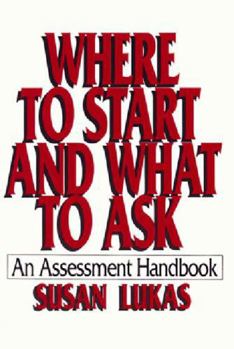Where to Start and What to Ask: An Assessment Handbook
Select Format
Select Condition 
Book Overview
As a life raft for beginners and their supervisors, Where to Start and What to Ask provides all the necessary tools for garnering information from clients. Lukas also offers a framework for thinking about that information and formulating a thorough assessment. This indispensable book helps therapeutic neophytes organize their approach to the initial phase of treatment and navigate even rough clinical waters with competence and assurance.
Format:Paperback
Language:English
ISBN:0393701522
ISBN13:9780393701524
Release Date:January 1993
Publisher:W. W. Norton & Company
Length:200 Pages
Weight:0.74 lbs.
Dimensions:0.7" x 6.2" x 9.3"
Customer Reviews
5 ratings
Excellent source of information !!!
Published by Thriftbooks.com User , 16 years ago
Excellent book, very informative about where to start and what to ask when in session with your client!!!
A must have for graduate students or mental health professionals
Published by Thriftbooks.com User , 16 years ago
This book is a quick read that clearly outlines exactly what the title says, where to start and what to ask. Questions to assess for suicidality, homicidality and abuse are provided. Intake interviews and the specific nuances involved are written about as well as a comprehensive set of questions to ask during an intake interview. There is a set of developmental and medical questions that really help to cover all the milestones. Some of the questions are quite detailed, but you can easily pick and choose what you want to utilize or leave out. I used many of the questions when developing my own intake interview questionnaire. Working with children, adults, couples and families are addressed as well as questions to ask during an initial intake interview for them. Pitfalls to look out for are given. This is a highly applicable book for those in the mental health or social work field.
An excellent, practical, how-to book to prepare social work/psychology students for practicum
Published by Thriftbooks.com User , 17 years ago
These days, in preparation for my internship in the fall, I'm trying to read books that will remind me how to work clinically. This one is excellent, and I deeply wish I had read it in my second or third year of graduate school. I had to learn a lot of this stuff on the job, through floundering and making mistakes, and my field experiences would have been worlds easier if someone had just told me these things. This is an extremely practical (NO theory) how-to book for social work/psychology students who are just starting out and want to know how to conduct initial interviews with various clients -- adults, children (and their parents), couples, families, etc. It also covers issues such as assessing for violent potential, suicidality, and child abuse/neglect. It's written in a very simple manner and the style and information is appropriate for students rather than professionals. However, it's serving as an excellent review for me. I also recommend it to supervisors as a good resource for providing guidance to their supervisees.
This is a great book!
Published by Thriftbooks.com User , 20 years ago
This is a really good book... I only wish I had it when I was a graduate student social worker. It would have helped me so much. What a terrific resource. My only regret: Susan you ought to write more books for student and entry level social workers. The reading was enjoyable, clear and took the mystery out of how-to-begin. Thank you, Susan.
Very helpful in explaining steps of interview process.
Published by Thriftbooks.com User , 26 years ago
I found this book to be very helpful in supervision of both students and professionals preparing for licensure. I have the 1993 edition and cannot find the audio tapes for the book which are named on the jacket, Thinking Like a Therapist ISBN 0-393-70160-3. Can you help me locate these tapes?





